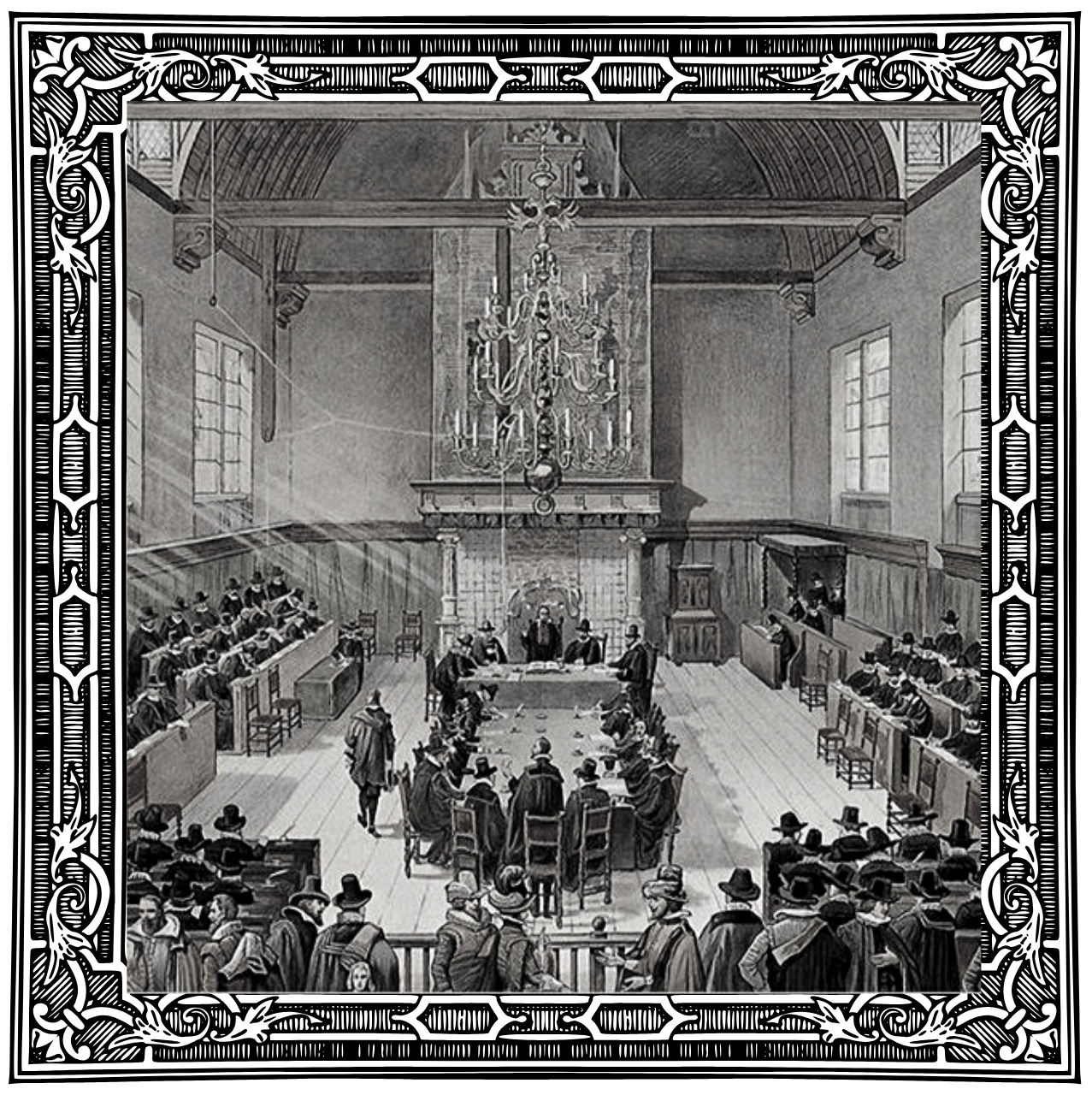An address first given at the Reformation O.C. Conference on preaching and predestination
October 2012
“An opiate of the flesh and the devil.”
“Satan’s stronghold where he lies in wait to wound and kill with the arrows of despair and self-assurance.”
“Makes God the author of sin, unjust, a tyrant, and a hypocrite.”
“Makes people sinfully self-assured because it persuades that nothing endangers the salvation of the elect, no matter how they live.”
What am I talking about? The Reformed Catholic understanding of predestination. Above are direct quotes from “Arminian” writers in the seventeenth century that I’ve interacted with in Grace Worth Fighting For. You’ve probably heard something similar because these criticisms are nothing new.
How do I as a Reformed pastor understand the connection between preaching and predestination?[1] That’s what I want to explore with you here.
Defining Preaching & Predestination
Preaching (and Evangelism)
When I say preaching I mean the official proclamation of the gospel. Preaching is official evangelism, in fact: “preach the word…do the work of an evangelist (2 Tim. 4:2, 5). Ministers of the Word evangelize through preaching.
But evangelism isn’t only preaching. It’s also the personal witness to the gospel by all believers. Peter told ancient Christians “in your hearts honor Christ the Lord as holy.” Why? They were to be “always…prepared to make a defense to anyone who asks you for a reason for the hope that is in you.” How? “with gentleness and respect” (1 Peter 3:15). Jude exhorted all believers “to contend for the faith” (Jude 3). In fact, “contending” was to lead to evangelizing: “have mercy on those who doubt.” At the same time “save others…snatching them out of the fire.” There are even others to whom we must “show mercy with fear, hating even the garment stained by the flesh” (Jude 22–23).
Predestination
Predestination is an aspect of the providence of God. His providence is his comprehensive presence and power over everything. It’s what Paul called God’s “purpose [by which he] works all things according to the counsel of his will” (Eph. 1:11). At it relates to his providence over the salvation of sinners, predestination is his “mercy on whomever he wills” (Rom. 9:18). This particular aspect of predestination is known as election to salvation.
All this to say Scripture unites preaching and predestination with a rule. One of the one hand, God is totally sovereign over everything, especially salvation. On the other, I’m totally responsible to preach. All of us are responsible for personally witnessing.
Importance of Preaching and Predestination
Why is preaching and predestination an important subject to consider?
We need to understand the ways of God

J. I. Packer said the biblical realities of God’s sovereignty (providence & predestination) and human responsibility aren’t contradictory. They’re also not merely a verbal paradox. Instead, they’re an antinomy. This means they appear to be a contradiction to us.[2] We need to accept both as true. They’re complimentary to each other. In God they reconcile. According to Packer:
A God whom we could understand exhaustively, and whose revelation of Himself confronted us with no mysteries whatsoever, would be a God in man’s image, and therefore an imaginary God, not the God of the Bible at all.[3]
We need to know why to preach & evangelize
Popular opinion says believing God predestines and elects places you among the “frozen chosen.” Those of us on “this side” of the theological fence have even contributed to this caricature. I say believing the Bible’s doctrine of predestination is the reason for preaching and personal evangelism.[4] Preaching and predestination go hand-in-hand.
Romans 9 on Preaching and Predestination
Let’s explore Romans 9–10 on preaching and predestination. Paul’s answered the question why didn’t all his fellow Jews believe in Jesus Messiah? He yearned for their salvation. His heart was full of “great sorrow and unceasing anguish for them.” He even “wish[ed]…I myself were accursed and cut off from Christ” for their sake (Rom. 9:2–3). Paul was perplexed by their unbelief despite having tremendous privileges. They had “the adoption, the glory, the covenants, the…law, the worship…the promises…the patriarchs.” Most importantly, “from their race…is the Christ” (Rom. 9:4–5).
This tremendous privileges and perplexity led Paul to answer three major objections.
God failed
“But it is not as though the word of God has failed” (Rom. 9:6). Why say this? Because even if others just felt this way, Paul had to verbalize it. God’s word (promises) didn’t fail because “not all Israel…are of Israel” (Rom. 9:6; NKJV). In other words, “not all [the Israelites] are children of Abraham [just] because they are his offspring” (Rom. 9:7). Paul’s proof are the genealogies in Genesis. God promised “through Isaac shall [Abraham’s] offspring be named” (Rom. 9:7). This means “it is not the children of the flesh who are the children of God, but the children of the promise” (Rom. 9:8). God later told Rebekah about the twins in her womb: “the older will serve the younger” (Rom. 9:12). Jacob and Esau weren’t born and hadn’t done either good or bad. This meant “God’s purpose of election might continue, not because of works but because of him who calls” (9:11). In other words, predestination was the foundation of patriarchal history: “Jacob I loved, but Esau I hated” (Rom. 9:13).
God is unjust
“Is there injustice on God’s part?” Paul emphatically denied: “By no means!” (Rom. 9:14). Why? Because God taught Moses: “I will have mercy on whom I have mercy, and I will have compassion on whom I have compassion” (Rom. 9:15). This meant that salvation “depends not on human will or exertion, but on God, who has mercy” (9:16). If it were based on works, there’d be an argument for one being more deserving than another. Instead, Paul pointed wrote that all are sinners and God chose to bestow love on some because he chose to love. For example, he saved Israel but hardened Pharaoh because he willed it (Rom. 9:18).
God made robots
“Why does he still find fault? For who can resist his will?” (Rom. 9:19) This was Paul’s rhetorical question. His answer wasn’t an answer, if measured by human wisdom. Yet it’s the greatest response in Scripture: “who are you, O man, to answer back to God?” (Rom. 9:20) In other words, there’s a limit to what God has revealed. Beyond that, we’re not curiously to pry. We’re simply to exult in God’s freedom to save us! Paul’s illustration was that God is like potter. As potter he has the right to make whatever he wants out of clay. He can make vessel for honor or dishonor (Rom. 9:20–23).
Application of Preaching and Predestination
I want to draw out several implications and applications of Paul’s teaching on preaching and predestination.
First, we must be concerned to evangelize those we know. Paul wrote of his own circle of influence, his fellow Jews. He knew these people. His heart was concerned about them. We, too, need to be for our unsaved loved ones. Love your neighbor by cultivating trusting relationships with the unsaved. Speak with them in love. What greater love can we show than to care for their eternal relationship with God? Therefore love your neighbors with urgency.
Second, pray for the lost. “My…prayer to God for them is that they may be saved” (Rom. 10:1). Ask God for opportunities to speak the Gospel. Beg him to open hearts and ears to hear and heed.
But why pray when the outcome is determined? The medieval theologian, Thomas Aquinas, asked this very question. He refuted three objections :
- Our temporal prayers can’t help make God’s eternal purpose;
- God doesn’t need our advice else he has defective knowledge;
- If our prayers can help God’s plan of predestination, they can also hinder it.
In these objections are two errors. Some say prayer or any good is superfluous. Why? Because the predestined will attain eternal salvation no matter what. In contrast, Aquinas asserted all the warnings of Scripture exhorting to prayer. Others say predestination can be altered through prayer. Against this, Aquinas cited “the gifts and the calling of God are without repentance” (Rom. 11:29).
So why pray if God predestines? According to Aquinas Scripture teaches divine ordination of all things along with its effect. Regarding his ordination, our prayers do nothing to predestination. In other words, it’s not because we prayed that we were predestined. Concerning the effects of predestination, we can’t forget that God’s providence includes “secondary causes.” In other words, God has predestined the saved. He’s also ordained all the helps and means we get there, including prayer. This means without our praying to receive Christ we won’t be saved. Prayer is a means through which predestination is most certainly fulfilled.
Third, we’re to offer the gospel to everyone and let God sort the rest out. The preacher’s job and the Christian’s job is to proclaim and share.We tell people “if you confess with your mouth that Jesus is Lord and believe in your heart that God raised him from the dead, you will be saved.” We do this because “there is no distinction between Jew and Greek…everyone who calls on the name of the Lord will be saved.” (Rom. 10:9–13) God even pleads with sinners to reconcile them to himself (2 Cor. 5:19–20). He genuinely offers salvation and spiritual rest to all who hear. But we let him figure out who actually believes.
Fourth, this salvation comes through the means of the preaching of the gospel. Paul asks a series of rhetorical “how will they’s” in Romans 10. How will they “call on him in whom they have not believed? … believe in him of whom they have never heard? … hear without someone preaching? … preach unless they are sent?” The answer? “Faith comes from hearing, and hearing through the word of Christ.” (Rom. 10:14–17)
Ordinarily speaking, no gospel preaching equals no salvation. Scripture says God has chosen an innumerable number (Rev. 7:14). They must hear the gospel for salvation. This means, “Never have we any right to assume that any man or group of men that we can name is outside of God’s plan for salvation.”[5]

Pop anti-Calvinistic apologists miss this about us Reformed believers:
From a thoroughly Calvinistic perspective…just as no amount of preaching will help the unelect, no failure of Christians to reach out to the elect will hinder them from coming to Christ. Thus, while the Gospel is to be proclaimed, it is difficult to see why we should be all that concerned—Calvinistically speaking. After all, according to Calvinism, the elect will be saved, period. The unelect will be damned period. If faith and unbelief are ultimately and inevitably the result of election and reprobation respectively, how could our evangelistic efforts or failure to evangelize really matter?[6]
Unfortunately, George Bryson doesn’t understand a simple biblical distinction: means versus end. The end is God’s goal for the predestined. Preaching is the means that accomplishes this in real people’s lives. Thus preaching is the necessary means God uses to bring the dead to life. Preaching and predestination go together. God promised salvation “before the ages began” then “manifested his word through…preaching” (Titus 1:1–3 ).
It’s not just that God sent his Son to the world (John 3:16). Now he sends preachers to tell the earth about him. Preachers aren’t sent randomly. Instead, the Spirit sends according to a plan whom, to whom, and when he pleases. There’s an intimate connection between preaching and predestination. Note Acts 16:6–10. Paul, Silas, and Timothy were going “through the region of Phrygia and Galatia.” How’d they get there? The Holy Spirit told Antioch’s leaders “set apart for me Barnabus and Saul” (Acts 13:2). He sovereignly choose whom he pleases “for the work to which I have called them” (Acts 13:2).
In addition, the Spirit chooses to whom or where and where not to preach. Why did Paul, Silas, and Timothy go Phrygia and Galatia? They were “forbidden by the Holy Spirit to speak the word in Asia.” They wanted to go north to Bithynia in the north. Instead, the Spirit led them through the center of Asia. They ended up in Mysia in the north-west corner of Asia. Why? This is where God gave Paul a vision of a Macedonian man (Acts 16:9) and left for Macedonia (Acts 16:10). Did the Macedonians deserved the gospel more, therefore? God forbid! The secret will of God is why he forbade Paul, Silas, and Timothy to preach. His revealed will was that they get to Macedonia. Preaching and predestination go together.
Conclusion: Preaching and Predestination United
Do preaching and predestination actually go together? Some say no. They say some believe in predestination and don’t preach? On the contrary, do others preach because they believe in responsibility? Packer simply explained this is a false dichotomy. All Christians believe in the sovereignty to God. How can we say this? All Christians pray, thank God for saving them, and ask the Lord to save their lost loved ones. The problem is that some Christians don’t realize this. Others haven’t thought it through. Some have presuppositions about God and humans causing their theology to be inconsistent with their practice of prayer.
Can predestination be used as an “opiate,” numbing us to live any way we want? Not if you believe what Paul said and seek to live as Paul lived. Predestination is the motivation to evangelize! Preaching and predestination go together.
[1] On election and the practical benefits it causes in us, see Horton, Putting Amazing Back Into Grace, 40–74. Three excellent books on Reformed evangelism are Tell the Truth by Will Metzger, God–Centered Evangelism by R. B. Kuiper, and J.I. Packer, Evangelism & the Sovereignty of God (Downers Grove: IVP, 1961).
[2] Packer, Evangelism, 18–22.
[3] Packer, Evangelism, 24.
[4] Packer, Evangelism, 10.
[5] J. Gresham Machen, The Christian View of Man (), 82.
[6] As found online at http://evangelicalarminians.org/files/Bryson.%20THE%20FIVE%20POINTS%20OF%20CALVINISM_%20WEIGHED%20AND%20FOUND%20WANTING.pdf.







